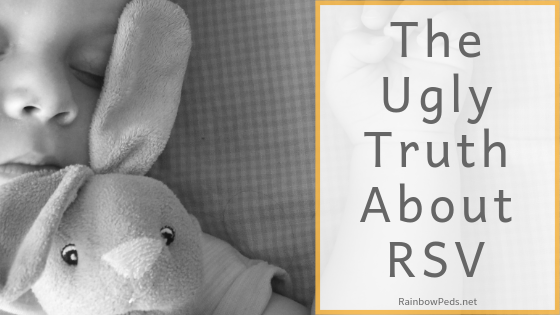The Ugly Truth About RSV
 Born at 26 weeks, Andrew and Annie have spent a large portion of their first year of life inside a hospital. Their parents are mindful individuals who do what they can to keep the kids healthy. They limit their exposure to people who are sick and elected to have the twins receive palivizumab (Synagis), a medication available to at-risk infants that helps reduce their risk of developing Respiratory Syncytial Virus (RSV).
Born at 26 weeks, Andrew and Annie have spent a large portion of their first year of life inside a hospital. Their parents are mindful individuals who do what they can to keep the kids healthy. They limit their exposure to people who are sick and elected to have the twins receive palivizumab (Synagis), a medication available to at-risk infants that helps reduce their risk of developing Respiratory Syncytial Virus (RSV).
Despite all the planning and precautions, Annie got sick. At first, it seemed like she just had a cold, but then her symptoms rapidly progressed, and her health declined. She had difficulty breathing and wasn’t eating.
Annie’s pediatrician diagnosed her with RSV and because of her symptoms she was sent to the hospital for treatment. Annie was in the hospital for four heart-wrenching days when she finally began improving and was eventually able to go home.
By the age of two, nearly every child has contracted RSV. It usually appears as a cold and can be treated at home, but in severe cases, RSV can quickly spiral into a lung or respiratory infection and require hospitalization. The CDC estimates that over 57,000 RSV-related hospitalizations occur each year in children under age five.
Anyone can develop RSV; however, children born prematurely as well as people who have immunodeficiencies, heart disease, or lung disease, are at the highest risk. Kids who attend daycare and those with siblings in school are also at an increased risk for developing RSV. This is because, like a cold, it is highly contagious.
The virus is passed through respiratory droplets. A person is typically contagious for up to eight days after being infected. The good news is that once you have had RSV, your body develops antibodies to help protect against future infections.
Since RSV can quickly worsen, it is essential for parents and caregivers to be on the lookout for signs of worsening symptoms. The biggest things to watch for include difficulty breathing, which may be seen as the chest pulling in when inhaling or short, quick breaths, fatigue, irritability, fever, and a bluish tinge to the skin – especially the lips and nail beds. If you notice any of these symptoms, a visit to the pediatrician or emergency room is essential.
Research is underway for developing a vaccine to protect against RSV. Until one is approved, the best defense is proper handwashing. The virus can live on hard surfaces for many hours, so it is important to disinfect toys, doorknobs and other hard surfaces if someone is sick in your home.
If you have concerns about RSV, schedule an appointment with your child’s pediatrician today.







